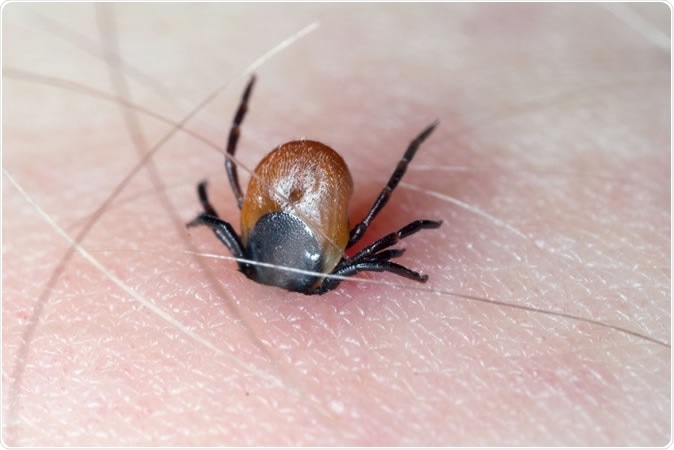Tick bites are known to spread infections. An infectious condition that can affect the brain has been identified for the first time in the United Kingdom and the disease has been found to spread via tick bites say sources.
According to the recent announcement from the Public Health England (PHE) there have been confirmed cases of tick-borne encephalitis virus infection and the infection has been found in the ticks of two parts of England - Thetford Forest and a region near the borders of Hampshire and Dorset. As of now the risk of human transmission is “very low” says the PHE.

Tick with its chelicerae sticking in human skin. Image Credit: Tomasz Klejdysz / Shutterstock
Ticks are small creatures or bugs that live on the skins and furs of animals including dogs and deer. They tend to bite humans especially those that walk in the country side. Ticks are usually found in vegetation and plants and they can jump onto a passing human or animal. They are flightless insects. Infected ticks are likely to spread diseases through their bites to humans. Ticks are becoming more common in the countryside due to the rising population of the deer says the PHE. However being bitten by a tick does not necessarily mean that a person would get an infection.
A virus called the Tick-borne encephalitis virus has affected some individuals in mainland Europe and Scandinavia as well as some parts of Asia. According to the PHE, it has now reached UK and the officials are keeping a close watch on its spread.
The experts have speculated that the infected ticks from the other regions may have travelled to UK on the migratory birds. According to PHE an European visitor, earlier this year got ill with the viral infection after being bitten by an infected tick while he was in the New Forest area.
Dr Nick Phin, from Public Health England, in a statement said, “''These are early research findings and indicate the need for further work. However, the risk to the general public is currently assessed to be very low.” The experts have said that most people who get bitten by an infected tick would have a low chance of catching an infection. Even if they do catch a virus, they might develop no symptoms of the infection or may have mild flu-like symptoms. In some individuals however the infection can spread to the central nervous system and affect the brain. In many cases involvement of the brain might be life threatening.
Dr Phin said, it was not only encephalitis that people needed to be aware of. Tick bites are also associated with Lyme disease. He said, “We are reminding people to be 'tick aware' and take tick precautions, particularly when visiting or working in areas with long grass such as woodlands, moorlands and parks.”
In order to reduce the risk of getting bitten by ticks, the PHE advises people to cover the exposed parts of the skin wearing full sleeved clothes, boots with trousers tucked into them or into the socks. An insect repellent can also keep the ticks away. The experts recommend not to wander in the wilderness especially with exposed bare skin. When bitten by a tick, the insect can be removed from the skin using tick-removal tweezers that is available at most chemists’ shops. These are fine tipped tweezers and once the ticks are removed, the area needs to be washed with soap and water and an antiseptic must be applied over it. If a person develops flu like symptoms or a red rash and recalls having been bitten by a tick, he or she needs to seek medical advice says the PHE.
Lyme disease warnings
According to the NHS, one of the commonest tick borne diseases is Lyme disease. It is a bacterial infection that leads to a circular red rash around the tick bite. The rash and symptoms may appear up to 3 months after the bite has actually occurred and persists for several weeks. These rashes may appear in crops and the edges of the rash appear raised. In addition there may be other symptoms such as fever, chills, headache, muscle and joint pain, fatigue and loss of energy etc.
Ticks causing Lyme’s disease are found across UK and some of the high risk areas include Scottish Highlands and southern England says the NHS. Wildernesses are particularly high risk areas.
Diagnosis of Lyme disease involves blood tests and treatment involves antibiotics course for up to three weeks. One of the best ways to avoid Lyme disease is to avoid being bitten by ticks.